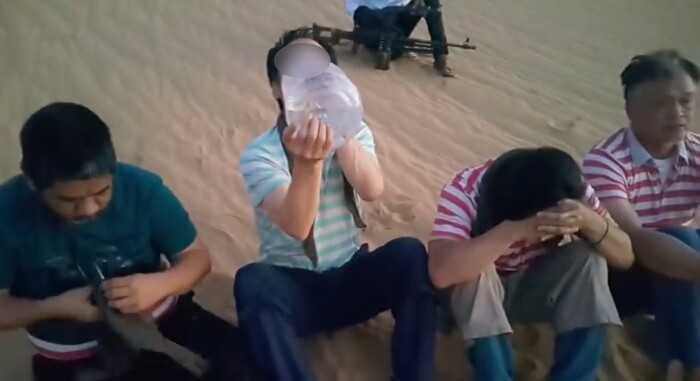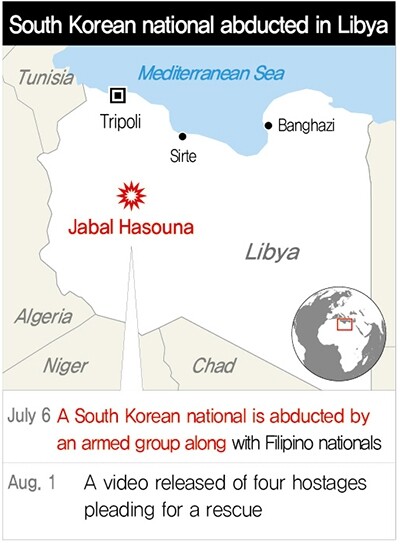hankyoreh
Links to other country sites 다른 나라 사이트 링크
Identity of people who abducted South Korean in Libya remains unknown

The identity of the armed group that abducted a South Korean national in Libya remains unconfirmed. The reason for the abduction and the group’s demands are also unclear, with no references to them in a video apparently posted by the group.
But with the South Korean national and other three hostages all shown pleading for their rescue, the group does at least appear to be interested in negotiating a release – an analysis bolstered by a Minister of Foreign Affairs (MOFA) official’s remarks that the group was “expected to present its demands shortly.”

The Libyan government is reportedly favoring the possibility that the group is an armed militia operating under orders from tribal forces in power within the region, rather than Islamist forces such as IS or Al-Qaeda.
“We have been hearing consistent accounts from the Libyan government in terms of the group’s character and hideout,” a MOFA official said.
“Our understanding is that they are working to persuade the tribal forces that are protecting the armed group,” the official added, suggesting tribal elders and/or relatives are being used to apply pressure against the group.
The likelihood that the group deliberately targeted a South Korean national does not appear high. In the video, the South Korean male is the second person shown appealing for a rescue, after a hostage from the Philippines. The group did not appear to place any specific emphasis on its South Korean hostage. The foreign camp attacked by the group was used primarily by workers from the Philippines and other nationalities. According to sources, the South Korean male who was abducted has lived in Libya for over 20 years and is familiar with the local situation.
In the video, the South Korean male is shown with a shaggy beard, wearing sandals and a light green striped shirt. He is also seen drinking water from a plastic jug as though thirsty. In his appeal for rescue, his voice sounds clear, suggesting no serious health issues. 218 News, the Facebook account to which the video was posted, reportedly has around 700,000 followers – indicating that the group hoped to see the video spread to numerous people.
The Libyan government is reportedly taking active steps to rescue the hostages, with a special committee formed in its High Council of State under the Deputy Prime Minister.
“The Libyan government appears to sense a particular weight of responsibility to South Korea after its contributions to its Great Man-Made River project,” a MOFA official said.
Refraining on principle from negotiating directly with the abductors, the South Korean government is now hanging its hopes on the Libyan government.
Over 1,700 armed groups are reportedly active in Libya today, including Islamic-related groups associated with Al-Qaeda and others. Also active are a number of armed militias associated with tribal forces that lie outside the central government’s control; kidnappings are a frequent occurrence. In Nov. 2017, Turkish workers at a hydroelectric power plant construction site in southwest Libya were abducted. They were eventually released seven months later. In Jan. 2014, Korea Trade-Investment Promotion Agency (KOTRA) trade unit director Han Seok-woo was abducted by armed assailants in downtown Tripoli. He was released after three days.
The South Korean government adopted an all-out security posture following the abduction, sending its Cheonghae anti-piracy unit into nearby waters. It also initially called for a moratorium on press reporting, noting that the matter concerned the life of a South Korean national.
“Libya is subject to a travel ban, and there are currently many South Koreans living there,” a MOFA official explained. “We requested the moratorium on reporting because they might be targeted if news is spread about the Cheonghae unit’s movements.”
“We were unable to sustain that any longer after the video was made public,” the official added.
By Yoo Kang-moon, staff reporter
Please direct comments or questions to [english@hani.co.kr]

Editorial・opinion
![[Column] Has Korea, too, crossed the Rubicon on China? [Column] Has Korea, too, crossed the Rubicon on China?](https://flexible.img.hani.co.kr/flexible/normal/500/300/imgdb/original/2024/0419/9317135153409185.jpg) [Column] Has Korea, too, crossed the Rubicon on China?
[Column] Has Korea, too, crossed the Rubicon on China?![[Correspondent’s column] In Japan’s alliance with US, echoes of its past alliances with UK [Correspondent’s column] In Japan’s alliance with US, echoes of its past alliances with UK](https://flexible.img.hani.co.kr/flexible/normal/500/300/imgdb/original/2024/0419/2317135166563519.jpg) [Correspondent’s column] In Japan’s alliance with US, echoes of its past alliances with UK
[Correspondent’s column] In Japan’s alliance with US, echoes of its past alliances with UK- [Editorial] Does Yoon think the Korean public is wrong?
- [Editorial] As it bolsters its alliance with US, Japan must be accountable for past
- [Guest essay] Amending the Constitution is Yoon’s key to leaving office in public’s good graces
- [Editorial] 10 years on, lessons of Sewol tragedy must never be forgotten
- [Column] A death blow to Korea’s prosecutor politics
- [Correspondent’s column] The US and the end of Japanese pacifism
- [Guest essay] How Korea turned its trainee doctors into monsters
- [Guest essay] As someone who helped forge Seoul-Moscow ties, their status today troubles me
Most viewed articles
- 1[Column] The clock is ticking for Korea’s first lady
- 2After 2 months of delayed, denied medical care, Koreans worry worst may be yet to come
- 3Hong Se-hwa, voice for tolerance whose memoir of exile touched a chord, dies at 76
- 4[Column] Has Korea, too, crossed the Rubicon on China?
- 5[Correspondent’s column] In Japan’s alliance with US, echoes of its past alliances with UK
- 6Samsung barricades office as unionized workers strike for better conditions
- 7All eyes on Xiaomi after it pulls off EV that Apple couldn’t
- 8[Editorial] As it bolsters its alliance with US, Japan must be accountable for past
- 9[News analysis] After elections, prosecutorial reform will likely make legislative agenda
- 10US overtakes China as Korea’s top export market, prompting trade sanction jitters